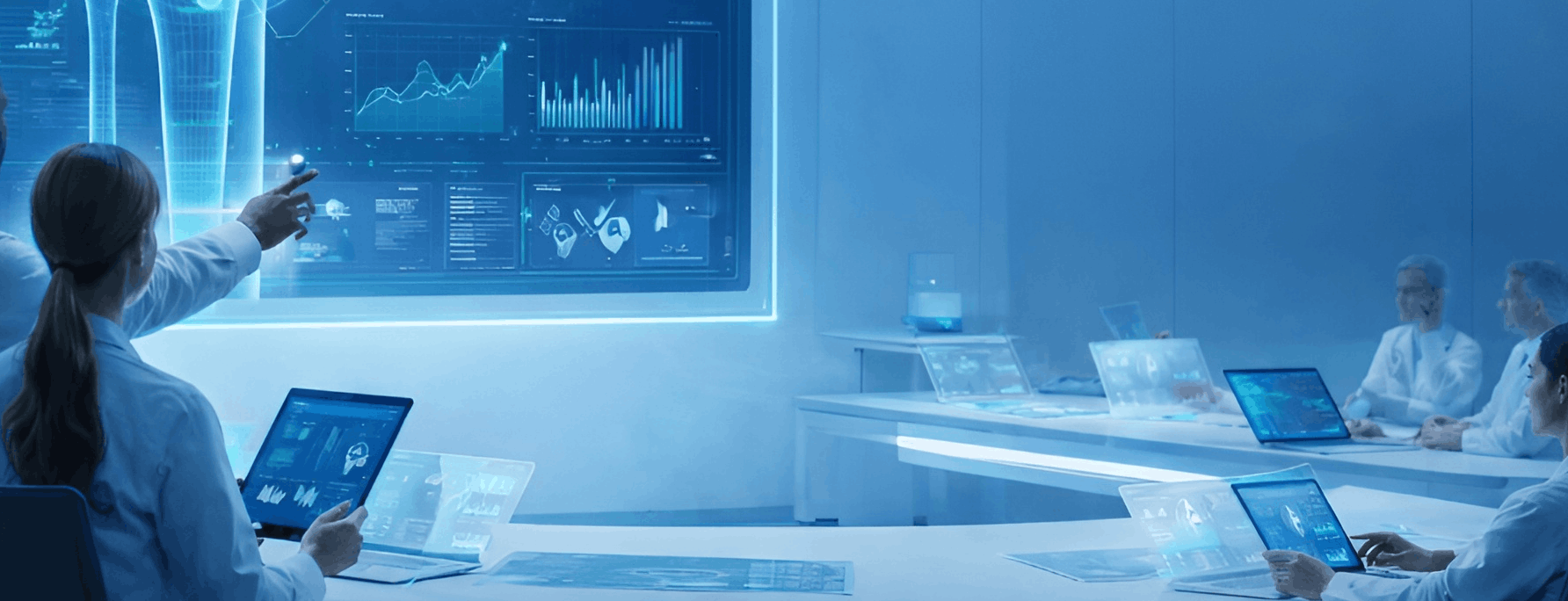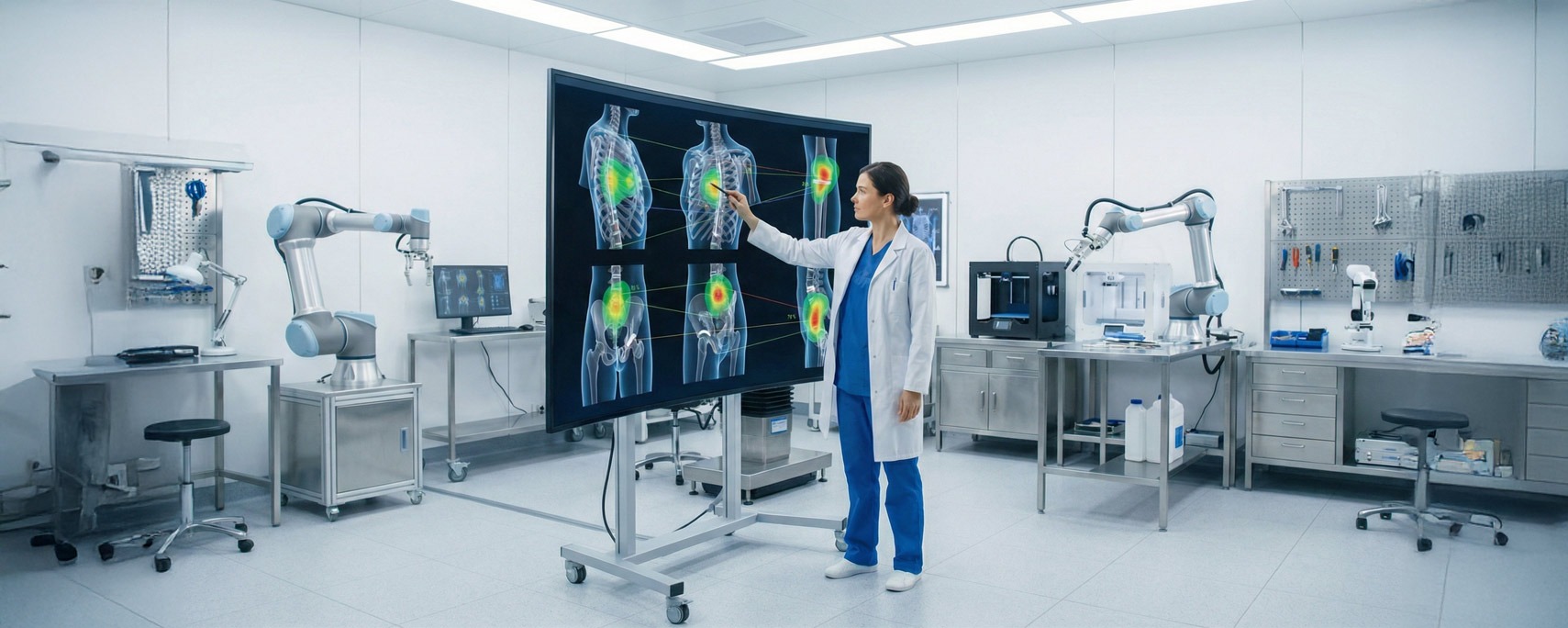IoT in Healthcare: Applications, Challenges, Benefits, & More
The Internet of Things (IoT) has become a transformative force across industries, revolutionizing the way businesses operate and interact with their environments. Among its numerous applications, the healthcare sector stands out as one of the most promising domains for IoT innovation.
By connecting devices, systems, and people, IoT enables real-time data exchange and facilitates more effective decision-making. In this blog, we will explore the applications, challenges, and benefits of IoT in healthcare and understand how this technology is reshaping the industry.
Understanding IoT in Healthcare
At its core, IoT in healthcare refers to a network of connected devices and sensors that collect, transmit, and analyze data to improve medical outcomes and operational efficiency. These devices range from wearable fitness trackers and remote monitoring systems to advanced diagnostic tools and smart hospital equipment.
IoT is not just limited to hardware; it also leverages advanced technologies such as artificial intelligence (AI) and data analytics to enhance the functionality and impact of these connected systems. For instance, wearable devices equipped with sensors can track a patient’s heart rate, oxygen levels, and physical activity in real time.
Similarly, smart hospital systems use IoT to manage inventory, monitor equipment performance, and ensure optimal patient care. By integrating these devices and systems, IoT has paved the way for more personalized, data-driven healthcare solutions.
Looking for Innovative IoT Solutions in Healthcare?
We can help you build smart, tailored solutions that boost productivity and reduce costs.
Let's Talk How!IoT in Healthcare Market Insights
- The global IoMT (Internet of Medical Things) market is forecasted to surge from $60 billion in 2024 to $814.28 billion by 2032, driven by an extraordinary CAGR of 38.5%.
- The wearable medical devices market is projected to grow from $45.0 billion in 2024 to $151.8 billion by 2029, with a robust CAGR of 27.5% during this period.
- The connected medical devices market is expected to expand at a CAGR of 19.3%, reaching USD 172.90 billion by 2030.
- The remote patient monitoring market is anticipated to grow at a CAGR of 8.74%, achieving a value of USD 4.07 billion by 2030.
Key Applications of IoT in Healthcare

Remote Patient Monitoring (RPM)
IoT devices in healthcare, such as smart blood pressure monitors and glucose sensors, allow healthcare providers to monitor patients outside the clinical setting. This is particularly beneficial for individuals with chronic conditions like diabetes or hypertension, as it reduces the need for frequent hospital visits and provides continuous insights into their health.
RPM solutions also enable early detection of potential health issues, allowing providers to intervene before conditions worsen. For example, IoT devices can alert doctors if a patient’s vitals deviate from normal ranges, ensuring timely medical attention and reducing the risk of complications.
Smart Hospitals
IoT is transforming traditional hospitals into smart healthcare facilities. These facilities leverage IoT for asset tracking, predictive maintenance, and real-time monitoring of critical systems. For example, IoT-enabled sensors can monitor hospital equipment, ensuring that devices like ventilators and MRI machines are functioning optimally. Predictive maintenance reduces downtime and prevents unexpected failures, enhancing operational efficiency.
Additionally, IoT solutions are used to track the movement of patients, staff, and medical supplies within the hospital. This not only improves workflow but also enhances patient safety by preventing errors such as medication mix-ups or misplacements of critical equipment.
Medication Management
Medication non-adherence is a significant challenge in healthcare, leading to poor patient outcomes and increased costs. IoT addresses this issue through smart pill dispensers and connected medication management systems.
These devices remind patients to take their medications at the prescribed times and notify caregivers if a dose is missed. Some advanced systems even adjust medication schedules based on patient data, ensuring optimal therapeutic outcomes.
Emergency Response Systems
Connected ambulances equipped with IoT sensors transmit real-time patient data to the hospital, allowing medical teams to prepare before the patient arrives. GPS-enabled trackers help locate the nearest available ambulance, reducing response times and improving patient outcomes.
Predictive Analytics in Patient Care
IoT generates vast amounts of data that can be analyzed to predict patient health trends. For instance, wearable devices can track a patient’s activity levels, sleep patterns, and stress indicators.
By analyzing this data, healthcare providers can identify early warning signs of illnesses and recommend preventive measures. Predictive analytics also helps in personalizing treatment plans, ensuring that patients receive care tailored to their specific needs.
Benefits of IoT in Healthcare

Improved Patient Outcomes
The real-time data provided by IoT devices in healthcare facility enhances the quality of patient care. Continuous monitoring enables early detection of health issues, leading to timely interventions. Personalized insights help patients better understand their health conditions and take proactive steps to manage them, resulting in improved outcomes.
Operational Efficiency
IoT streamlines various administrative and operational processes in healthcare. For example, automated inventory management systems ensure that medical supplies are always available, while predictive maintenance reduces equipment downtime. IoT also simplifies patient admission and discharge processes, freeing up resources for more critical tasks.
Cost Reduction
By enabling early detection and preventive care, IoT reduces the need for expensive medical treatments and hospitalizations. Remote monitoring solutions minimize unnecessary visits to healthcare facilities, saving both time and money for patients and providers. Additionally, efficient resource utilization lowers overall operational costs.
Remote patient monitoring through IoT health devices is projected to generate an economic impact of up to $1.6 trillion annually by 2025.
Enhanced Patient Engagement
IoT devices in healthcare empower patients to take an active role in their healthcare. Wearable fitness trackers and health apps provide real-time feedback on physical activity, diet, and sleep patterns, encouraging healthier lifestyles. By staying informed about their health, patients are more likely to adhere to treatment plans and make informed decisions.
Challenges of IoT in Healthcare

Data Privacy and Security Risks
The vast amounts of sensitive patient data generated by IoT devices make healthcare systems a prime target for cyberattacks. Ensuring compliance with regulations like HIPAA is critical to protect patient information. Encryption, multi-factor authentication, and regular security audits are essential measures to mitigate these risks.
Integration Complexities
Integrating IoT devices with existing healthcare IT systems, such as EHRs, can be challenging. Interoperability issues often arise due to the lack of standardized protocols, making it difficult to seamlessly exchange data across platforms. Overcoming these challenges requires collaboration between device manufacturers, software developers, and healthcare providers.
High Implementation Costs
While IoT offers long-term cost savings, the initial investment in devices, infrastructure, and training can be prohibitively high, especially for smaller healthcare providers. Governments and private organizations must explore funding options and subsidies to make IoT adoption more accessible.
Data Overload and Management
IoT generates enormous volumes of data, which can be overwhelming to manage and analyze. Without proper tools and processes, healthcare providers may struggle to derive actionable insights from this data. Advanced analytics platforms and AI-powered solutions are crucial to address this challenge.
The Future of IoT in Healthcare
The future of IoT in healthcare looks promising, with advancements in connectivity, AI, and data security set to drive innovation. The rollout of 5G networks will enhance the speed and reliability of IoT devices, enabling more sophisticated applications. AI-driven IoT systems will provide deeper insights and predictive capabilities, transforming healthcare from reactive to proactive care.
Blockchain technology is another area with significant potential. By securing patient data through decentralized systems, blockchain can address privacy concerns and build trust in IoT-enabled healthcare solutions. Additionally, the integration of IoT with telemedicine will further expand access to quality care, particularly in remote and underserved areas.
IoT Solutions for Smarter Healthcare: Powered by Dash Technologies
At Dash Technologies, we specialize in delivering cutting-edge IoT solutions that are transforming healthcare delivery. By integrating IoT devices with advanced analytics, we empower healthcare systems to predict trends, detect early signs of complications, and deliver proactive care.
Our expertise in healthcare IT extends beyond IoT device implementation—we focus on creating fully integrated ecosystems that support interoperability across existing systems, such as EHRs. At Dash Technologies, we are committed to ensuring the highest standards of data security, compliance with regulations, and delivering cost-effective solutions.
Whether you’re looking to enhance patient monitoring, streamline asset management, or leverage predictive analytics, Dash provides the tools and expertise to help you drive smarter, more efficient healthcare solutions. Contact us today to discuss your business requirements!
About Dash

Dash Technologies Inc.
We’re technology experts with a passion for bringing concepts to life. By leveraging a unique, consultative process and an agile development approach, we translate business challenges into technology solutions Get in touch.







